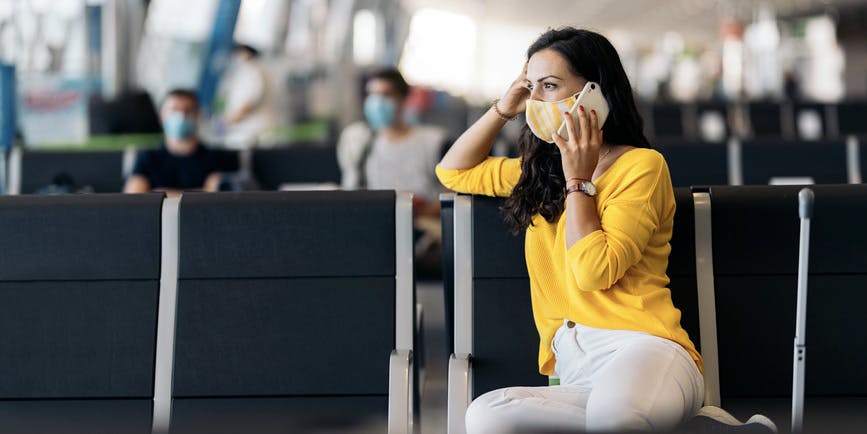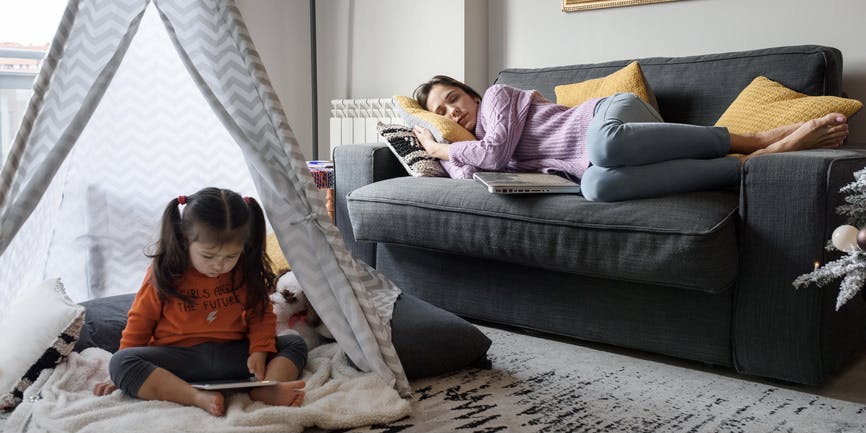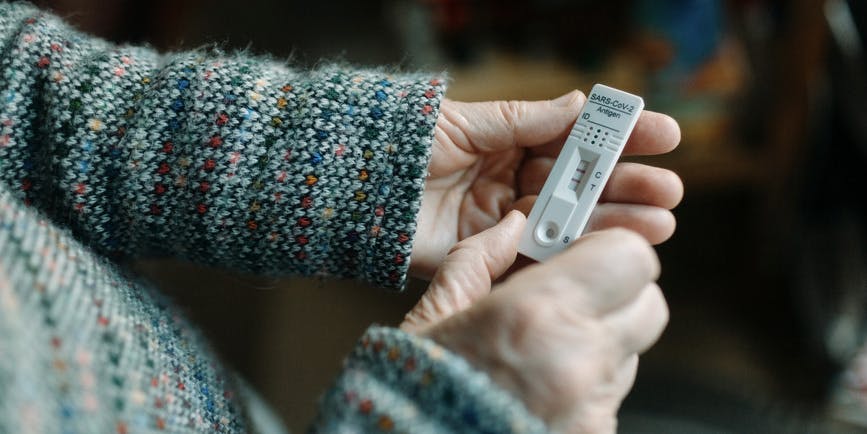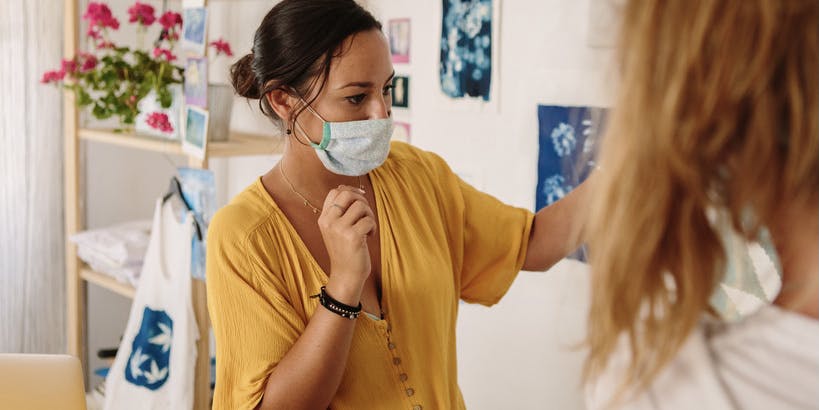
Can dogs get Covid-19—and spread it to humans?
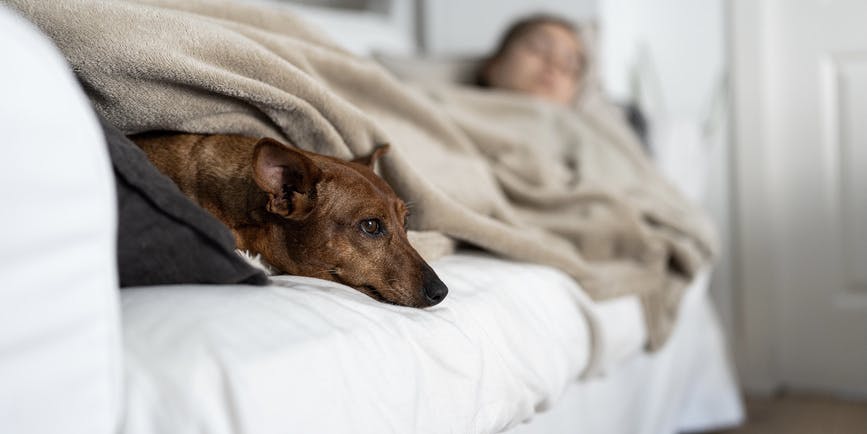
Topics
Key Points:
- Dogs can get Covid-19—but most won’t develop symptoms.
- Humans can spread Covid-19 to pets, but dogs don’t spread the virus to people.
- You can reduce the risk of passing Covid-19 to your dog by not cuddling, kissing or sleeping with them while you’re infected.
We know how rough it can feel when a canine companion falls under the weather—especially as our dogs can’t tell us what ails them. So, it’s fair to wonder, “Can my dog catch Covid?”
Early reports by the USDA show that over 400 pets in the US have been infected with the virus since the pandemic began. Tracking in this area is limited, and studies suggest that dogs getting sick with Covid-19 is far more common than we’ve recorded.
Dr. B offers online Covid treatment for humans—not pets. But we’re all about keeping furry friends safe and happy. So read on to learn what health experts know about Covid-19 and dogs.
Can humans give dogs Covid-19?
Covid-19 has been reported in 26 species globally—and pets are more at risk because they’re often in close contact with humans.
In one study, almost 15% of dogs who lived with a Covid-19-positive human tested positive for Covid-19 one week later. Covid-19 was not found in dogs who live in shelters, implying that dogs do not spread Covid to each other.
Can dogs give humans Covid-19?
No evidence suggests that dogs spread Covid-19 to humans via saliva, skin, fur or hair. The spread of Covid-19 from other animals to humans has only happened in abnormal circumstances, like when a cat in Thailand infected a veterinarian by sneezing in the veterinarian’s face.
This means you don’t have to “disinfect” your pets to protect yourself. Wiping or cleaning your dog with disinfectants like alcohol, hydrogen peroxide, hand sanitizer or disinfectant wipes will do more harm than good!
Should you stay away from pets if you have Covid-19?
The best way to protect your dog from Covid-19 is to keep them apart from infected humans. If you have an active Covid-19 infection, use the same prevention protocols with your pets as you do for other humans:
- Don’t cuddle, kiss or sleep with your dog.
- Wash your hands regularly, especially before playing with or feeding your dog.
- Encourage ventilation by opening windows and turning on air purifiers.
- Wear a mask if you’re in a close space with your pet (like a vet’s office or the car).
There’s no dog treatment for Covid-19. Health professionals warn against masking dogs to prevent infection. Masks can disrupt dogs' breathing or temperature regulation. And heavy chewers may break off and swallow pieces of the mask.
What happens if a dog gets Covid?
In one study, over 80% of dogs + cats infected with Covid-19 showed no symptoms. Like humans, high-risk pets include older dogs and those with other medical conditions.
When symptoms do occur, mild symptoms include sneezing + extreme fatigue. More severe Covid-19 symptoms in dogs include:
- Fever
- Cough
- Difficulty breathing / shortness of breath
- Runny nose
- Eye discharge
- Vomiting
- Diarrhea
Infection doesn’t guarantee a lengthy immunity—one studied dog tested negative for Covid-19 antibodies at the one-month mark. And studies show that Covid-19 can cause the same neurological and lung issues in dogs as in humans. So, if your dog seems a little off weeks after an infection, seek help from your veterinarian.
What to do when a dog has Covid
If your dog has Covid-19, contact your veterinarian and follow their advice. If you have Covid-19, don’t take your dog to the veterinarian. Instead, ask about drop-off or remote appointment options.
Again, dogs do not spread Covid-19 to humans or other dogs. Still, the CDC recommends distancing practices for infected dogs. Discourage interaction with other dogs while on walks and avoid the dog park or doggy daycare. Your dog can resume their routine if they’ve had no symptoms for at least 72 hours without medicine and it’s been 14 days since they tested positive or if they have a confirmed negative test result.
How to get Covid medicine—for humans!
We hope this makes you feel more confident about protecting your dogs from Covid-19.
If a human you love is under the weather, Dr. B is here to help with affordable health care for over 30 common conditions. Our consultations for online Covid treatment cost just $15 for paying patients—and licensed health providers often send prescriptions for Covid medicine to your chosen pharmacy within three working hours. We also have a No-Cost Care program for those who need financial help.
Learn more about How It Works and get started today!
Sources:
Center for Disease Control and Prevention. (2022). What you should know about Covid-19 and pets.
Center for Disease Control and Prevention. (2022). Animals and Covid-19.
Hamer, S.A., et al. (2020). Natural SARS-CoV-2 infections, including virus isolation, among serially tested cats and dogs in households with confirmed human COVID-19 cases in Texas, USA. BioRxiv.
Kim, D., et al. (2023). Neurologic Effects of SARS-CoV-2 Transmitted among Dogs. Emerging Infectious Diseases.
Mallapaty, S. (2022). First reported case of a person getting COVID from a cat. Nature.
Miro, G., et al. (2021). SARS-CoV-2 infection in one cat and three dogs living in Covid-19-positive households in Madrid, Spain. Frontiers in Veterinary Science.
U.S. Department of Agriculture Animal and Plant Health Inspection Service. (2023). Confirmed cases of SARS-CoV-2 in Animals in the United States.
World Organization for Animal Health. (2022). SARS-CoV-2 in animals, situation report 19.
Topics
Sign up for the free Dr. B newsletter for a weekly report on the latest in healthcare + research-based advice for staying healthy and mentally well.
Related articles

